The Lawyer and the Punk
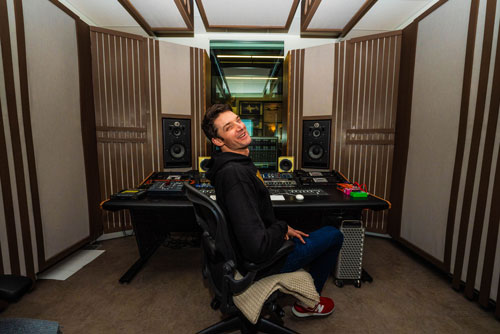
Story by Chris Francis '13
Dave Rossi ’07 started his career as a famous punk rocker. Now he's a lawyer creating the newest recording hub of Central Illinois.
When Dave Rossi ‘07 was growing up in Bloomington, his physician and surgeon dad told him, “It doesn’t matter if you become a garbage man, as long as you try to be the best garbage man you can be.”
That sentiment was put to the test in 2000 when, following a late-night audition in the depths of winter, Dave came into his parents’ bedroom to tell them he was dropping out of college to become a punk rock drummer.
“I think he just sighed and said ‘Okay,’” Dave remembered.
Today, Dave works as a lawyer, but drumming is in his soul. As he sits in his newly constructed high-end recording studio in the old industrial district of west Bloomington, he compulsively plays beats on his knees and explains how a 140-year-old limestone block warehouse makes for perfect acoustics.
It’s probably one of the highest quality recording environments in the state, hand-built by a rocker from the pop-punk heyday of the early 2000s. If Dave can fully realize his dream for Bombsight studios, it will soon become a recording hub of the Midwest and perhaps the ultimate evolution of Dave’s dreams of punk rock stardom.
· · ·
Dave really did not want to go to college, in his own words.
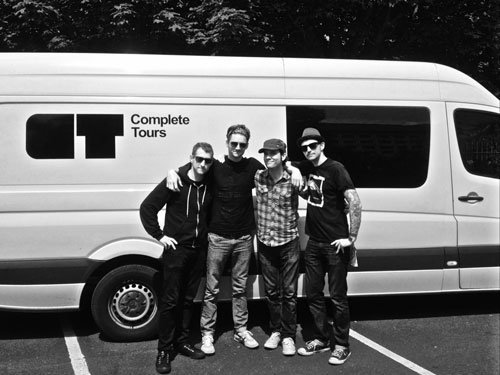
Coming to Illinois Wesleyan in 1998, he never picked a major before dropping out to play drums with the Chicago pop-punk band Allister. He had been recruited as a swimmer, but the only thing he cared about was music.
“I was no dummy, but I’d say that I wasn’t exactly a stellar student,” Dave said.
That wasn’t a problem for his career as a punk drummer, which was an experience he
still marvels at.
“When you’re on the road and your band is doing well,” well enough to tour across the United States and internationally, “you have very little responsibility,” Dave said. “I just had to get myself behind a drum set for an hour and 20 minutes every night. The rest of it was a free-for-all.”
As for Dave’s parents, while they were never against his choice, Dave had the sense that he needed to prove that he was serious about being a musician. It was in his determination that he discovered a well of focus and drive that would fuel his achievements through the rest of his life. That, plus plenty of luck, proved to his parents that their son being a punk rock drummer was just as good as any other profession.
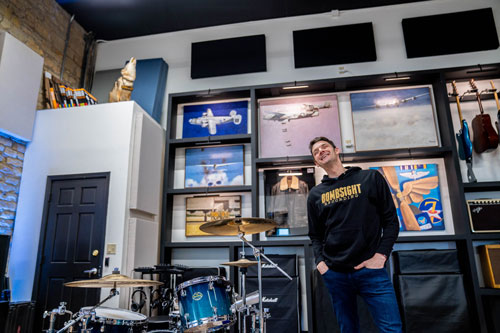
Dave found himself riding the height of Chicago’s pop-punk scene alongside bands like Fall Out Boy and Rise Against. From 2000 to 2003, Dave recorded and toured with Allister, being featured on their album Last Stop Suburbia with songs like “Somewhere on Fullerton.”
Commercial success of any kind is almost unheard of for a band, and sustained success for any musician is one-in-a-million at best. So, when life circumstances pulled Dave away from Allister, he made a go of several other bands in Southern California before coming to a realization.
“I can understand why people do it,” Dave said of successful musicians who devote their lives to recording and performing. “Even if you’re not in a huge band anymore, it’s an addictive lifestyle. Absolute freedom.”
“I always knew that I would be in bands,” Dave said, “but I didn’t know if lightning could strike twice.” So he pivoted from punk rocker to law student.
· · ·
Law school wasn’t a part of Dave’s plan until he came back to Illinois Wesleyan to complete his bachelor’s degree. He picked a major this time around: philosophy. He was especially inspired by Associate Professor Mark Criley and engrossed by his philosophy of law class, which set him on his new career path starting at Drake University Law School in Des Moines, Iowa.
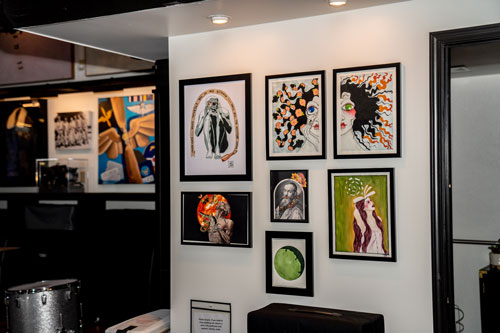
Those who would describe themselves as “not exactly a stellar student” aren’t usually the best material for law school, but the only thing that had been missing for Dave during his first attempt at college was interest and focus. Despite finishing his degree in 2010, during what Dave described as the worst job market for lawyers in recent American history, he began his career practicing complex immigration litigation.
But what could be punk about getting a law degree? Was Dave selling out?
“I don’t know if I agree with that,” Dave said. “One of my favorite bands of all time is NOFX, and they sing a lot about important political and societal stuff. It’s about how, if you’re in a position — I don’t want to say a position of power, because that’s not the right way to put it — but if you’re in a position to understand and assist, you can do a lot of good for society. I feel like I can do that as an attorney, and that’s not anti-punk.”
“I was a prosecuting attorney in McLean County for a few years,” Dave went on, “and I think my background helped me have a more common-sense approach. I wasn’t like, ‘I just wanna put this guy in jail.’ I think my background in music has shaped how I see people and how I handle conflict and disagreement.”
So, what does it mean to be punk?
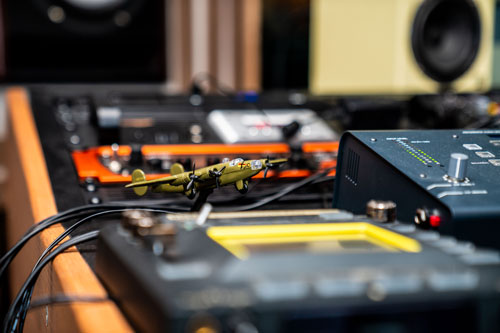
“To me, it’s about not accepting society’s norms,” Dave said, which sometimes means enforcing laws with compassionate understanding.
But, even if Dave could manifest some amount of punk in his new career, he couldn’t make music as a lawyer. He would need to moonlight as the punk rocker he always was.
Dave wasn’t a law student in Des Moines for long before he made his first attempt at constructing a recording studio in the basement of an old office building. Thanks to a chance meeting with a tattoo artist whose brother-in-law was “an amazing battle DJ,” he developed a side-hustle recording, producing and playing in the Des Moines music scene, starting with local hip-hop artists.
“I think I’m always going to do both [law and music],” Dave said. “When I spend a long time on recording and producing, I start to want to read some legal articles, and vice versa.”
But in 2021, Dave decided he was going to fully invest in music and change the industry landscape in Central Illinois.
· · ·
Dave was sold on the building that would become Bombsight Recording Studio as soon as he walked into the more-than-a-century-old rail depot. The ceiling was yards above his head, allowing plenty of room for soundwaves to be scattered and absorbed by walls made of weathered, porous limestone blocks. The fact that the building was right next to a train yard was immaterial to the foot and a half of stone that blocked nearly all outside sound.
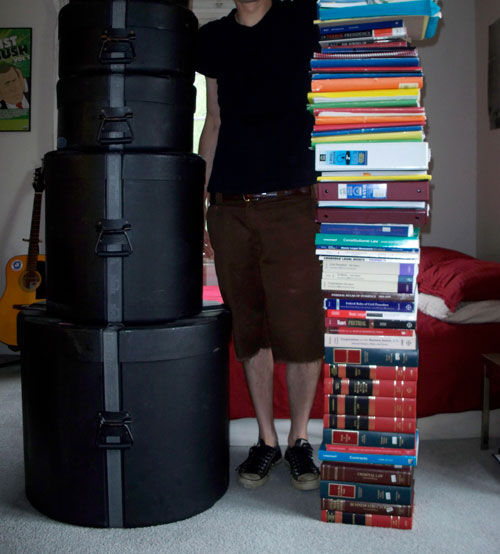
Building on that frame, the old warehouse is now precisely designed for audio engineering and artistic expression. Dave’s control booth is something like a space capsule, built with his own hands as a separate compartment insulated by air, rubber and foam that eliminates outside sound waves to an oppressive degree. Stepping into it gives the sensation that the atmosphere has been sucked out of the room as all the background sounds one takes for granted are obliterated. The only thing Dave wants to hear is exactly what his mics are recording.
The actual recording room’s limestone walls are plastered with wood and foam panels, and, where there aren’t wall fixtures that further control sound, there is local art and memorabilia that cultivates a vibe of experimental creativity with a distinct punk edge — emphasized by a giant painting of a B-24 bomber dropping a payload of microphones.
While it drips with counter-cultural attitude, the space is organized and professional, and the technical quality is near top-notch, with Dave outwardly dreaming about using the studio’s success to upgrade the electronics to the top tier. But he recognizes that a legendary studio is defined by who is using it.
“Some of the greatest hip-hop records you’ve heard were recorded in hotel rooms,” Dave said. “The equipment and environment is secondary to the person running it.”
As far as who is using it now, Dave has welcomed artists and bands from around Central Illinois, and he’s looking forward to recording the Illinois Wesleyan Jazz Combo and Big Band in April.
“I don’t like the thought of local bands going other places to record, because they should be able to make remarkable records in Central Illinois,” Dave said. “I don’t see this place becoming a destination studio, but I do think it can become an institution, especially given what this place’s ceiling and walls can do with drums.”
The name Bombsight itself is inspired by Dave’s 99-year-old grandfather, who was a bombardier in the Second World War’s Pacific theater. Dave has a Norden bombsight — a special scope used to aim bombs on-target — from a B-24, along with a Second World War bomber jacket framed next to his grandfather’s own war-inspired paintings.
Watching Dave play his drum set in front of his grandfather’s memorabilia, the name comes together. The sound of punk drums, even while expertly controlled, overwhelms like a bomb blast. And what could be more punk than an artist fighting empires?